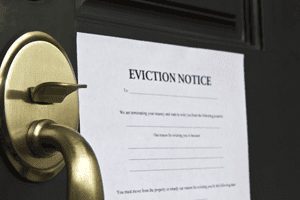
Tenants can change the locks to their home provided the tenancy agreement does not prohibit this.
Tenant changing locks, is it criminal Damage?
If the tenancy prohibits a tenant changing the locks without written consent and the tenant goes ahead and does it anyway: then this could be a breach of tenancy. Legal minds have argued changing the locks, could mean this is equivalent to criminal damage.
The topic, “changing the locks without consent is a criminal offence” is one that leads to a heated debate on the subject between lawyers. It’s one topic that will draw lawyers into the ring to argue their point.
A survey revealed that about 16% of tenants are guilty of changing locks without landlords’ consent.
Some tenants, when they do change the locks, do it to feel safe; they are not aware who else has a set of keys to the property. Previous tenants or a trade person might have a bunch of keys, to feel at better the locks are changed.
However, strictly speaking, if the tenancy prohibits a tenant from changing the locks, this squarely is a breach of tenancy. Provided a set of new keys are provided to the landlord or agent, this should be acceptable to all parties concerned.
If a tenant changes the locks without permission and in turn, the tenant provided a set of keys to the landlord or agent. Then it may not profit a landlord to argue to any positive avail that a breach has been committed.
Where locks have been changed, and a set of keys have been provided to the landlord, I know of no case where a landlord has successfully sued a tenant.
Breach of Tenancy changing locks without landlord consent
However, I have seen section 8 notices citing ground 12, where the locks have been changed without permission. Yet, the section 8 notice in almost all these notices has other more substantial grounds for eviction, and the lock issue usefully is not the bone of contention.
In my opinion, it would be unwise to serve a section 8 notice citing ground 12 for the tenant changing the locks with consent as the only ground for eviction. If the tenant has changed the locks and is denying access to the landlord, agent, or a trade person, then that is another matter.
Some lawyers have argued a tenancy that stipulates the tenant is not permitted to change the locks to the property is an unfair contract. I know of no case that has succeeded in such a legal argument.
When can tenants change the locks?
If the tenant does change the locks without permission, then the tenant should keep the original lock fittings.
Changing the locks should be done by a qualified locksmith. Any damage caused the door, or the door frame is a cost the landlord will be entitled to claim from the tenant.
A tenant should not attempt to change the locks themselves; the task might seem straight forward, often leads to damage to the door and in some cases, the property is less secure then it was before the new lock change.
Changing the locks without permission could affect the tenant’s deposit
Changing the locks with the consent of the landlord and giving the landlord a set of keys will in itself cause no problems. Problems arise when the locks have been changed and the tenant has done a DIY job. If the door or the door frame is damaged the landlord is likely to get the job done properly and seek the costs for doing so from the tenant. The money may well be deducted from the tenant’s deposit. If the landlord has consented to the locks being changed, the tenant still has a legal obligation not to cause damage to the door or door frame. A professional locksmith will fit the correct lock, correct size and the door is likely to lock easier and the door closing properly into the door frame.
A tenant changing the locks does frequently cause a problem for the deposit at the end of the tenancy and if the lock is going to be changed you should consider using a local locksmith.
Author: Amanda Goldsmith – [email protected]
Source: British Landlords Association
British Landlords Association is a free national association for UK landlords, why not join us for free now!
You may seek free legal advice from the BLA helpline if you are members, alternatively, you can seek advice from Landlord Advice UK




